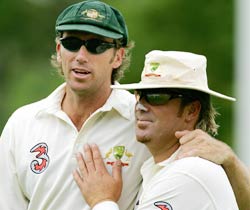In Shane Warne and Glenn McGrath, Australia couldn't have chosen more diverse protagonists to script their age of dominance.
 One is the wild kid of Australian cricket; the other a shy introverted champion. One honed his art from the school level and worked his way through the grades, the other gave up caravans and life in the bushes to hurl the leather. One let talent take its course; the other outgrew it.
One is the wild kid of Australian cricket; the other a shy introverted champion. One honed his art from the school level and worked his way through the grades, the other gave up caravans and life in the bushes to hurl the leather. One let talent take its course; the other outgrew it.
One thrives on variety; the other on the lack of it. One is a burly blond-spike haired predator who closes in silently, with three slow, purposeful strides, on the prey; the other an "Ambrose-thin" operator, who bustles in and kills the target with clinical efficiency.
One embraced a forgotten art with flamboyance; the other took over the traditional mantle with discipline. One bowled the ball of the century; the other isn't far from being the bowler of the century.
McGrath could be a role model for youngsters; Warne has perennially been opposed as one. McGrath struggled to get a fifty on the board till his 102nd match; Warne always bet on him to score one.
Australia are lucky the two, great bowlers and great characters, were born in the same generation. Where countries struggled to find such lethal bowlers once in an era, Australia had two, born within a year of each other.
When McGrath came into the side, Warne was already the rock star of the team. In just a year of his Test debut, the leg-spinner had given the measure of his skill with an audacious leg-break to Mike Gatting in the first Ashes Test at Old Trafford in 1993.
Warne, born in Victoria, started playing serious cricket at the St. Kilda's Cricket Club in his home state. Went to England to experiment his stock, was a ward of the Australian Cricket Academy and played for Victoria and Australia 'A' before making the top grade.
McGrath made a late career choice. He gave up the wandering in the caravan around New South Wales and picked up the cricket ball at the age of 17. But within five years he won the state cap for the Blues and progressed to Test level after merely his eighth first-class appearance, replacing Merv Hughes.
He took a while to take off in international cricket. The four-Test series in the West Indies in 1995 could well have been the defining phase in McGrath's career. The fortunes of his team ebbed and soared through those heady 34 days. But in the low-scoring series, he emerged as Australia's most successful bowler.
He earned 17 scalps in the series and claimed his first five-wicket haul (5-68) during the first Test in Barbados.
Since then, the two have gone from strength to strength. Supporting each other through injuries, standing up for each other in controversies. All the time giving an account of their spirit and raising the bar for their team.
People wonder about McGrath's nagging consistency in line and length as much as they marvel at Warne's feet-wide turners. And together they have taken more than 1000 Test wickets.
Warne and McGrath, at 35, are standing at their individual pedestals. Warne has the highest wickets in Test history (583), while McGrath is content being the Australian hero. With 499 Test wickets, he is the most successful Australian fast bowler.
If their individual statistics and experience are a threat enough, their combination has often wrecked havoc on the opposition. Of the 89 matches they both have featured in, Australia has won 58.
Since Warne made his debut against India in Sydney in 1992, there have been only 13 instances where neither of them has turned up for Australia. Of those, Australia won only five, including two against Zimbabwe; the winning rate dropping drastically from 65.16 per cent to 38.46 per cent.
Of the 123 matches he's played, Warne has been in the winning side for 75 matches. Of the 109 McGrath's played in, Australia have won 75.
Their worth is also evident from the fact that the two combined have amassed more than 52 per cent of the wickets in Australia's kitty in last ten years. And they have picked wickets at an eerily similar rate while playing home or away. Warne's mark hovers round 26 runs per wicket, while McGrath's average is consistently around 21.
Much of Australia's success is attributed to their fast scoring. But it is Warne and McGrath who have provided them with the aggressive edge. In their own contrasting ways, they have been able to lead Australia to dizzy heights of success. The Australian juggernaut wouldn't have powered on flawlessly without these demolition men.






